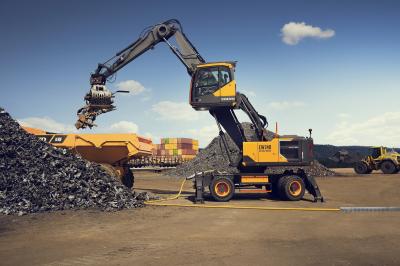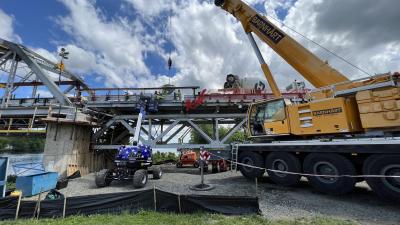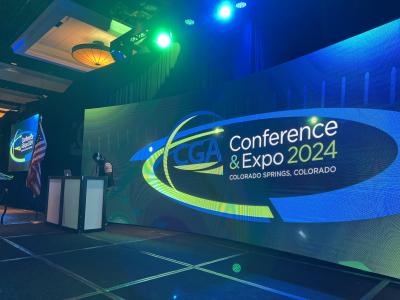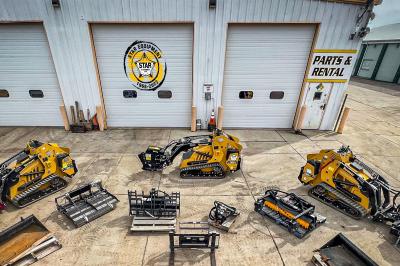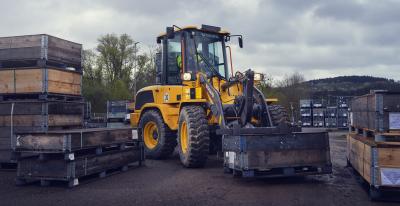Daene Boomsma first built his name as a homebuilder. His construction company, Boom Construction, thrives in Rapid City, S. D., due to his attention to detail and one-on-one relationship with each of his customers. But in order to build a house, you’ve first got to dig a hole — and Boomsma took matters into his own hands to ensure his homes were built to his quality expectations.
“We live in a beautiful area, but unfortunately there are a lot of soils that are unstable — there’s a lot of shale,” said Boomsma. “That was the primary driver for starting my own excavating company — I couldn’t get the work done the way I wanted it done. Once I started… doing the work the way it needed to be done to accommodate the soil problems, we were able to build in areas that other builders weren’t… or were afraid to build.”
The company Boomsma formed, Professional Excavating, has grown exponentially since it was formed — almost tripling in business each year. To accommodate that growth, the company has doubled its fleet from one 16-ton (14.6 t) excavator to two 16-ton excavators. And due to fuel savings, the support of the local dealer, and an ambitious maintenance, telematics and warranty package offered by the manufacturer (Case ProCare), he’s been able to grow the business with minimal impact to his bottom line.
“During my five slowest months — we made half the payment on fuel savings alone,” said Boomsma. “It was the difference between my operators running a 10-year-old machine or a brand new machine. When I can do that and not cost myself anymore because of fuel savings — now I’ve got happier operators and an image that said ’we care about our equipment and we buy good equipment.’ [And] it’s not costing me anything because of the fuel savings.”
Size, Fuel Savings
Drive Choice
As Boomsma updated his excavator fleet, two primary factors affected machine selection: fuel savings and the size of the machine. He specified a machine in the 16-ton size class because it proved easy to haul in and out of residential areas, and it could be outfitted with larger buckets for greater productivity. (The excavators he ultimately chose — two CX160Cs from Case — weigh in at 38,001 lbs. [17,237 kg] and are 9-ft. [2.7 m], 8-in. [20 cm] tall by 8-ft. [2.4 m], 5-in. [12.7 cm] wide).
“He does a lot of residential work, and you don’t want to be bringing a lowboy in and out of some of these [residential areas],” said Marcus Lavake, complex manager, Titan Machinery (local Case dealer). “But you still need the biggest machine to move the amount of dirt that is required. On this machine he actually uses a 48-inch bucket, which is just about the largest that you’d use [on this size machine], and it handles the rock and denser soils well — yet [the machine] has the mobility.”
“We can get in and out a lot quicker than other contractors because we have equipment just big enough that we can do the work twice as fast, but just small enough that we can still fit in all of our sites,” said Boomsma.
Initially, he only intended on adding one new machine to his fleet to complement the 16-ton excavator he already owned. But a head-to-head analysis of his machine helped convince him to trade it in and add two new Case CX160Cs.
“We discovered that, depending on the use and what we were doing at the time, we were going to save between 2 and 5 gallons an hour with the Case CX160C versus the 160 that I owned,” said Boomsma.
Using the conservative end of that spectrum (2 gal. [7.6 L] per hour) and average diesel prices in South Dakota on Nov. 4, 2014 ($3.43 per gallon), Boomsma can save approximately $343 per week on one excavator and $686 per week on two. Spread out over the course of the month, and savings can be as much as $2,744. With fuel savings in some applications ranging as high as 5 gal. (18.9) per hour — and diesel fuel fluctuating north of $4/gal. throughout the year – the actual savings could be significantly higher. Annual savings start at just under $33,000.
“The fuel savings alone made half of my payments that I had on my two machines,” said Boomsma. “[And that doesn’t take] into account any production, any work I’ve done.”
“At the end of the day, he’s actually spending less money on better equipment,” said Lavake. “We were able to double his fleet, double his capacity and reduce his expense. A side benefit that we didn’t expect is that his operators are actually happier, they’re in an environment in their machine where they’re not tired at the end of the day.”
The main drivers for the fuel savings are advances in hydraulics and electronics. The CX160C features the Case Intelligent Hydraulic System (CIHS), which includes four integrated hydraulic control systems that, through the machine’s lift/dump and dig/curl movements, optimizes the power being put forth by the machine — requiring it to use only as much power (fuel) as is necessary to complete the job. It also features three different working modes —speed priority, heavy and automatic — that allow the operator to further dial the machine into the site conditions.
“There are three different levels of throttle,” said Boomsma. “We were used to running the machine full throttle all the time — that was the old mentality. When we first got these, we tried the three different levels. The highest throttle obviously consumes more fuel — and then we made the guys run it in the economy [automatic] mode, and pretty much we get just as much done at full throttle as we do with economy mode.
“We don’t run at anything but economy mode. When I pull up to a job site, I barely hear the machine running. When it’s working, it’s at a constant dull roar. I know when I pull up, the lack of sound is money in my pocket based on fuel.”
Increasing Uptime and Making Total
Cost of Ownership Predictable
Fuel savings is only a part of the equation for Professional Excavating. Titan Machinery and Case were able to make owning and operating costs for the first three years of ownership predictable through Case ProCare. ProCare includes a three-year Advanced Case SiteWatch subscription, a three-year/3,000-hour full-machine factory warranty and a three-year/3,000-hour planned maintenance contract.
That combination — warranty, planned maintenance contract and telematics —fully protects Boomsma from unexpected owning and operating costs. It also helps boost his return on investment, as Case estimates that the maintenance/service-related cost savings for those first three years of ownership with ProCare comes out to approximately $9,540 per machine, $19,080 for two.
ProCare also creates a new level of customer service from his equipment dealer, who monitors the machines’ telematics feeds and schedules service at times that won’t slow work down.
“I literally do nothing besides grease and fuel the machines for the first three years,” said Boomsma. “When the service manager is calling us at 250 hours [for a fuel filter change] and he’s going to do it after hours — I have no downtime, I have no maintenance cost. I have no doubts of downtime knowing that we’re running brand-new equipment and, if something goes down, they’re going to replace it with a [comparable] machine in 24 hours.”
The ability for his dealer to monitor the telematics feed, combined with the planned maintenance contract, assures Boomsma that his operators can focus on operating without worrying about maintenance.
“I don’t make money sitting in a machine,” added Boomsma. “Nobody is going to take care of that equipment like I would — and I don’t expect them to. This takes that variable out of it. I don’t have to worry about how many hours the machine has on it, is the oil getting changed? Is the oil pressure running too high because there’s a fault? I can put my operators in there and expect them to do exactly that: be an operator.”
“All they have to worry about is digging this hole, and we can take care of everything else,” said Lavake. “It enables that one-on-one interaction and we can really dial in our service, in any amount of convenience for the customer, in a way that they’ve never seen before.”
The telematics solution also provides Boomsma with insight into the performance of his equipment/workforce without having to drive out to the job site.
“I know if he’s running or not, I can pull it up on the computer and see if the machine is turned on, if it’s idling — it just gives me an idea of where they’re at in the job.”
All things considered — the fuel cost savings combined with the peace of mind and improved customer service made possible by ProCare — Boomsma is most satisfied with his company’s ability to keep ahead of schedule.
“A company of my size, when we are running as hard as we do all the time, I can’t have downtime. It screws up the schedule, and that’s one of the advantages of why people hire me — they know I’m going to be there when I say I’m going to be there. I can’t do that with equipment failures.”
Philippe Bisson is the brand marketing manager of Case Construction Equipment.
Today's top stories





